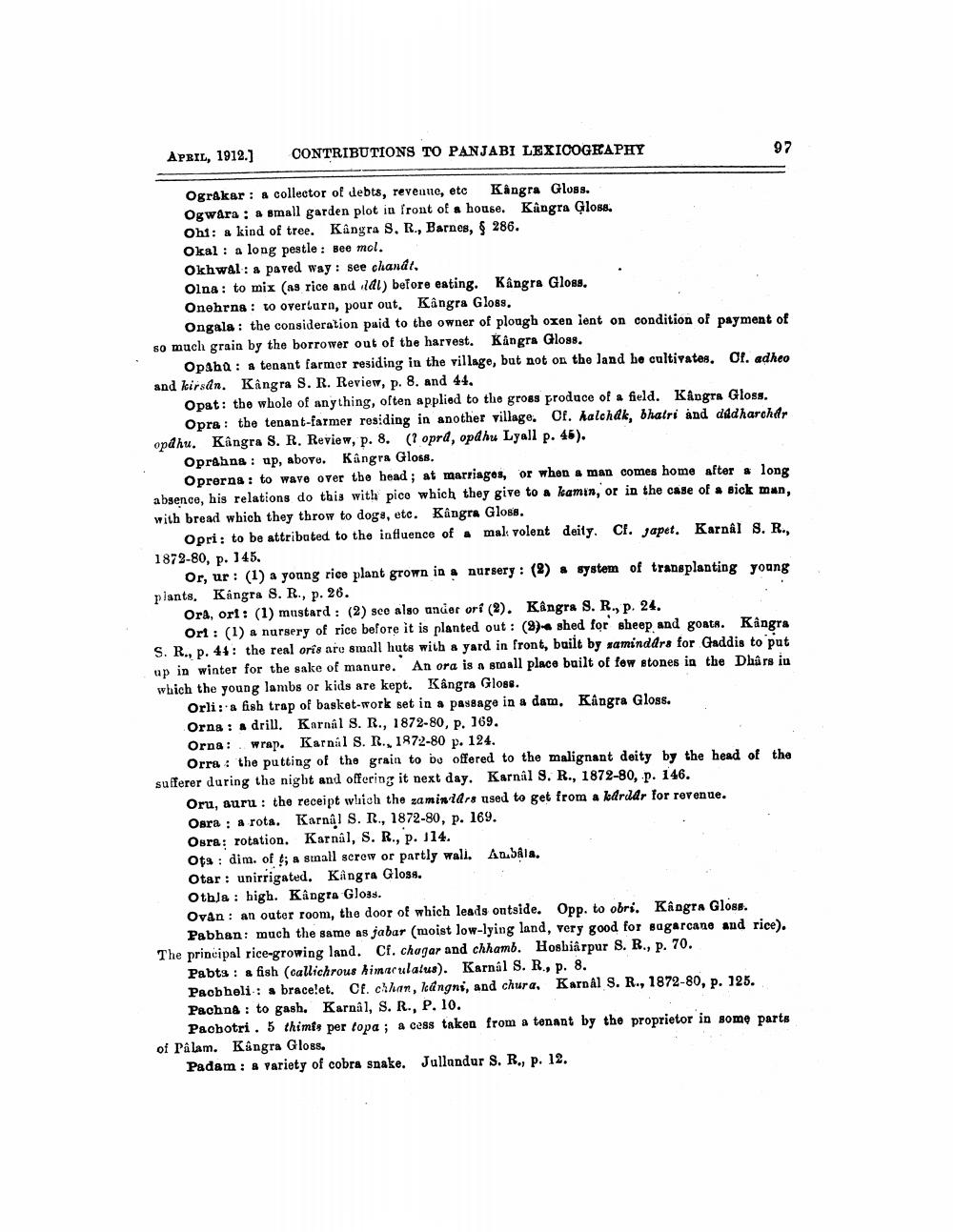________________
APRIL, 1912.]
CONTRIBUTIONS TO PANJABI LEXICOGRAPHY
Ogråkar a collector of debts, revenue, etc
Kangra Gloss.
Ogwara: a small garden plot in front of a house. Kangra Gloss. Ohi: a kind of tree. Kângra S. R., Barnes, § 286. Okal a long pestle: see mol.
Okhwal: a paved way: see chanât,
Olna: to mix (as rice and lal) before eating. Kangra Gloss.
Onehrna: to overturn, pour out. Kangra Gloss.
Ongala: the consideration paid to the owner of plough oxen lent on condition of payment of so much grain by the borrower out of the harvest. Kangra Gloss.
Opaha: a tenant farmer residing in the village, but not on the land he cultivates. Of. adheo and kirsan. Kangra S. R. Review, p. 8. and 44.
Opat: the whole of anything, often applied to the gross produce of a field. Kângra Gloss. Opra: the tenant-farmer residing in another village. Cf. halchak, bhatri and dadharchar opdhu. Kangra S. R. Review, p. 8. (1 oprd, opdhu Lyall p. 45).
Oprahna: up, above. Kângra Gloss.
Oprerna to wave over the head; at marriages, or when a man comes home after a long absence, his relations do this with pice which they give to a kamin, or in the case of a sick man, with bread which they throw to dogs, etc. Kângra Gloss.
Opri: to be attributed to the influence of a mal volent deity. Cl. Japet. Karnal S. R., 1872-80, p. 145.
Or, ur: (1) a young rice plant grown in a nursery: (2) a system of transplanting young plants, Kangra S. R., p. 26.
97
Kângra S. R., p. 24.
Ora, ori: (1) mustard: (2) see also under orf (2). Ori: (1) a nursery of rice before it is planted out: (3) shed for sheep and goats. Kângra S. R., p. 44: the real oris are small huts with a yard in front, built by samindars for Gaddis to put up in winter for the sake of manure. An ora is a small place built of few stones in the Dhârs in which the young lambs or kids are kept. Kângra Gloss.
Orli: a fish trap of basket-work set in a passage in a dam. Kangra Gloss.
Karnal S. R., 1872-80, p. 169. Karnal S. R., 1872-80 p. 124.
Orna: a drill. Orna: wrap.
Orra: the putting of the grain to be offered to the malignant deity by the head of the sufferer during the night and offering it next day. Karnal S. R., 1872-80, p. 146.
Oru, auru: the receipt which the zaminidrs used to get from a kardar for revenue.
Osra a rota. Karnal S. R., 1872-80, p. 169.
Osra: rotation. Karnal, S. R., p. 114.
Ots: dim. of t; a small screw or partly wall. An.bala.
Otar: unirrigated. Kangra Gloss.
Othla: high. Kângra Gloss.
Ovan: an outer room, the door of which leads outside. Pabhan: much the same as jabar (moist low-lying land,
Opp. to obri. Kângra Gloss.
very good for sugarcane and rice).
The principal rice-growing land. Cf. chagar and chhamb. Hoshiarpur S. R., p. 70.
Pabts: a fish (callichrous himaculatus). Karnal S. R., p. 8.
Pacbheli: a bracelet. Cf. chhan, kangni, and chura, Karnål S. R., 1872-80, p. 125. Pachna to gash. Karnal, S. R., P. 10.
Pachotri. 5 thimie per topa; a cess taken from a tenant by the proprietor in some parts
of Pâlam. Kangra Gloss.
Padam: a variety of cobra snake. Jullandur S. R., p. 12.




